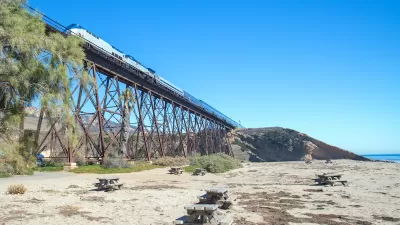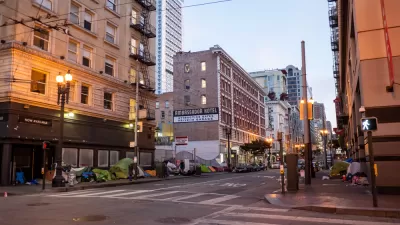“[There] is something about the frequency with which California and 'the future' are used synonymously,’ writes Kristin Miller. But the future looks much different when set in Southern California as compared to Northern California.
Does this story line sound familiar? “10 to 150 years from the present, California has succumbed to natural disaster/economic and governmental collapse/a pandemic, which leaves Southern California a corporate-fascist-military state with gross financial and racial inequality and urban squalor—while Northern California rips up its pavement, learns permaculture, gets spiritual, and models better living through technology and communitarian diversity,” writes Kristin Miller in a recent article for BOOM: A Journal of California.
In Los Angeles, a dystopian future has pervaded even policy circles. Miller cites Mike Davis, who in Ecology of Fear noted that the LA 2000: A City for the Future redevelopment plan mentioned one famous example, Blade Runner, in “warning of what could happen were the plan not adopted.” The plan called it “the Blade Runner scenario: the fusion of individual cultures into a demotic polyglotism ominous with unresolved hostilities.”
To the north, however, “Northern California-as-utopia...is strongly linked to the countercultural movement of the sixties, with its guides for technologically advanced back-to-the-land living.”
Texts like Ecotopia, Always Coming Home, and The Fifth Sacred Thing “depict Northern California as central to both speculative and practical visions of sustainable survival.”
A final, powerful point from Miller: “In the frontier myth of American history, California represents the completion of a manifestly destined expansion across the continent. It’s easy to see Utopian San Francisco and 'Hell A' as twin land’s-ends for idealists and cynics.”
FULL STORY: Postcards From the Future

Alabama: Trump Terminates Settlements for Black Communities Harmed By Raw Sewage
Trump deemed the landmark civil rights agreement “illegal DEI and environmental justice policy.”

Study: Maui’s Plan to Convert Vacation Rentals to Long-Term Housing Could Cause Nearly $1 Billion Economic Loss
The plan would reduce visitor accommodation by 25% resulting in 1,900 jobs lost.

Planetizen Federal Action Tracker
A weekly monitor of how Trump’s orders and actions are impacting planners and planning in America.

Wind Energy on the Rise Despite Federal Policy Reversal
The Trump administration is revoking federal support for renewable energy, but demand for new projects continues unabated.

Passengers Flock to Caltrain After Electrification
The new electric trains are running faster and more reliably, leading to strong ridership growth on the Bay Area rail system.

Texas Churches Rally Behind ‘Yes in God’s Back Yard’ Legislation
Religious leaders want the state to reduce zoning regulations to streamline leasing church-owned land to housing developers.
Urban Design for Planners 1: Software Tools
This six-course series explores essential urban design concepts using open source software and equips planners with the tools they need to participate fully in the urban design process.
Planning for Universal Design
Learn the tools for implementing Universal Design in planning regulations.
Caltrans
Smith Gee Studio
Institute for Housing and Urban Development Studies (IHS)
City of Grandview
Harvard GSD Executive Education
Toledo-Lucas County Plan Commissions
Salt Lake City
NYU Wagner Graduate School of Public Service





























